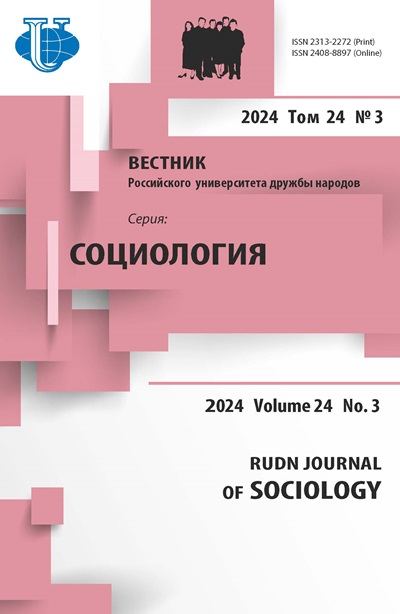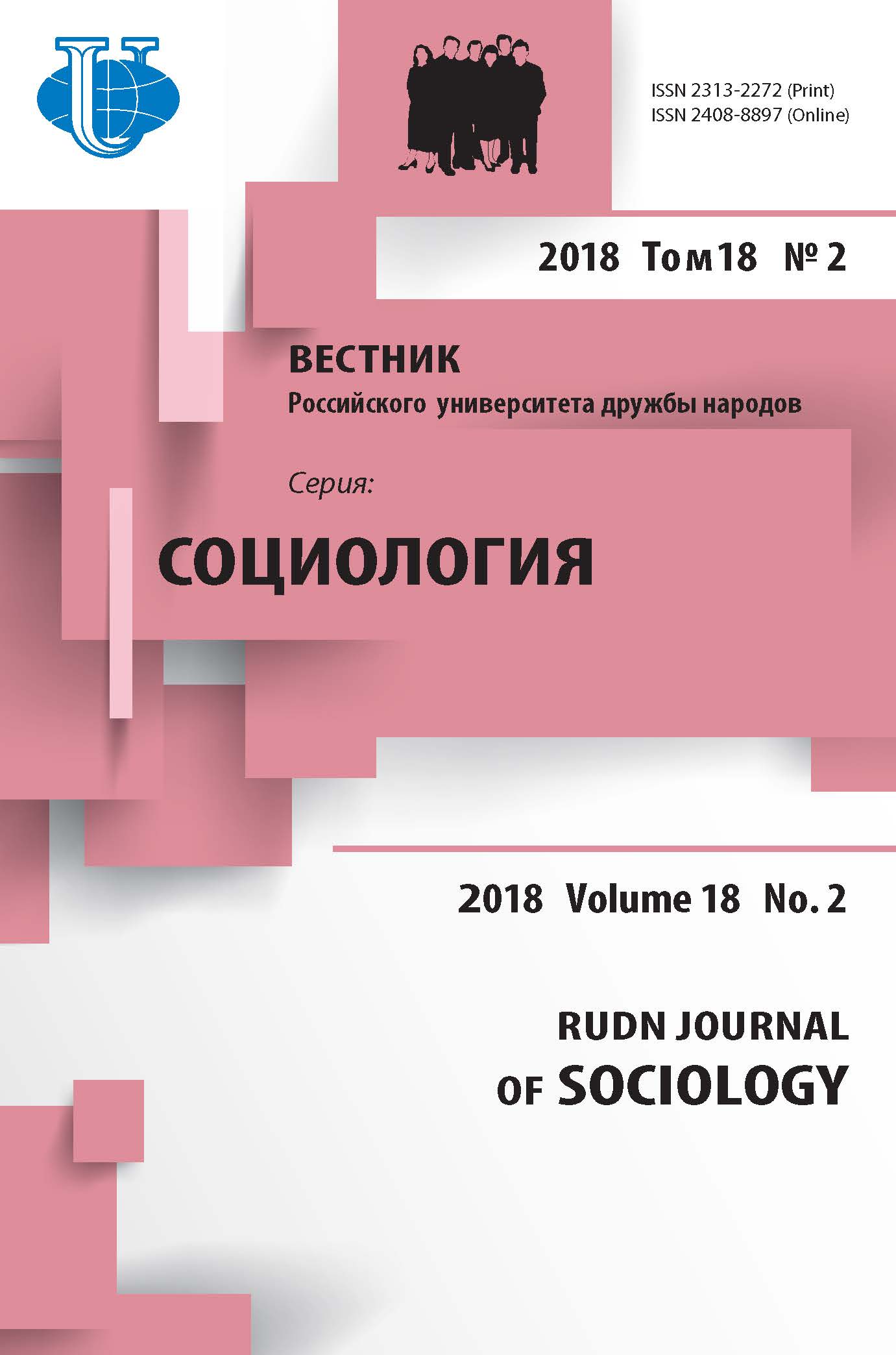Interculturalism: Postmulticultural discourse of social integration
- Authors: Kuropjatnik AI1, Kuropjatnik MS1
-
Affiliations:
- Saint Petersburg State University
- Issue: Vol 18, No 2 (2018)
- Pages: 250-261
- Section: Contemporary society: the urgent issues and prospects for development
- URL: https://journals.rudn.ru/sociology/article/view/18451
- DOI: https://doi.org/10.22363/2313-2272-2018-18-2-250-261
Cite item
Full Text
Abstract
In the current postmulticultural debates, interculturalism is a model of integration in the contexts of diversity, a way to conceptualize global social-cultural reality, and an intercultural dialogue or an instrument of ‘positive interaction’. The Council of Europe, European Commission and UNESCO consider interculturalism a main model of social integration in the contexts of diversity. Interculturalism takes into account the multiplicity of identities, differences and modes of coexistence inherent in the era of ‘super-diversity’, and mobility diversification under globalization. In the postmulticultural perspective, interculturalism is a part of the debates on ‘the end of multiculturalism’ that has lost its symbolic capital. Interculturalism develops a new narrative of social integration based on rethinking of ideas and social situations, shifting contexts and symbolic inversions, thus, becoming relevant to the social and cultural reality of the 21st century. However, interculturalism does not replace multiculturalism as the third strategy of integration beyond multiculturalism and assimilation for it implies various integration models such as Quebec interculturalism and European interculturalism with the revived idea of the nation state. Interculturalism focuses on creating ‘a formula for coexistence’ under super-diversity, and is not limited to the immigration context; it emphasizes the multidimensionality of differences (professional, gender, ethnic) in the context of inequality including the nation state. Theoretical heterogeneity and thematic diversity of interculturalism and the ambivalence of its concepts can determine new challenges for the national and international structures that rely on it. Interculturalism considers management of cultural diversity and development of intercultural dialogue as functions of not only government structures, but also of other segments of society such as educational and civil society institutions, private sector and local communities.
About the authors
A I Kuropjatnik
Saint Petersburg State University
Email: alkuropjatnik@mail.ru
Universitetskaya Nab., 7/9, Saint Petersburg, 199034, Russia
M S Kuropjatnik
Saint Petersburg State University
Email: kuropjatnik@bk.ru
Universitetskaya Nab., 7/9, Saint Petersburg, 199034, Russia
References
- Громыко Ал.А. Европейские исследования: дилеммы универсальности и уникальности (к 60-летию региональной интеграции) // Современная Европа. 2017. № 2. С. 6-17
- Bokova I. Foreword. Interculturalism at the Crossroads. Comparative Perspectives on Concepts, Policies and Practices. Ed. by F. Mansouri. Paris: UNESCO Publishing; 2017. P. 3-4.
- Bouchard G. Interculturalism: what makes it distinctive? Interculturalism and Multiculturalism: Similarities and Differences. Ed. by M. Barrett. Strasbourg: Council of Europe Publishing; 2013. P. 93-110.
- Bouchard G. What is Interculturalism? McGill Law Journal. 2011: 56 (2). P. 435-468.
- Bouchard G., Taylor C. Building the Future: A Time for Reconciliation. Québec: Government of Québec; 2008.
- Bradley W. Is there a post-multiculturalism? Studies on Multicultural Societies. No. 19. Shiga: Ryukoku University; 2013.
- Busch D., Möller-Kiero J. Rethinking interculturality will require moral confessions: Analysing the debate among convivialists, interculturalists, cosmopolitanists and intercultural communication scholars. Interculture Journal. 2016: 15: 43-57.
- Cantle T. Cohesion and integration: From ‘multi’ to ‘inter’ culturalism. Actes du Symposium international sur I’inteculturalisme. Dialogue Quebec-Europe. May 25-27. Montreal; 2011. P. 2-48 // www.symposium-interculturalisme.com.
- Сantle T. Community Cohesion: A Report of the Independent Review Team Chaired by Ted Cantle. London: Home Office; 2001.
- Cantle T. Interculturalism as a new narrative for the era of globalisation and super-diversity. Interculturalism and Multiculturalism: Similarities and Differences. Ed. by M. Barrett. Strasbourg: Council of Europe Publishing; 2013. P. 69-91.
- Сantle T. Interculturalism: For the era of globalization, cohesion and diversity. Political Insight. 2012: December: 38-41.
- Caponio T., Donatiello D. Intercultural policy in times of crisis: Theory and practice in the case of Turin, Italy. Comparative Migration Studies. 2017: 5 (13): 1-16.
- Emerson M. Summary and conclusions. Intercultutalism. Europe and its Muslims in Search of Sound Societal Models. Ed. by M. Emerson. Brussels: Centre for European Policy Studies; 2011. P. 1-16.
- Fleras A. Case Studies, Insights, & Debates. Unequal Relations. The Politics of Race, Ethnic and Aboriginal Relations in Canada. Toronto: Pearson; 2012.
- Fleras A. Moving positively beyond multiculturalism: Toward a post-multicultural governance of complex diversities in a diversifying Canada. Zeitschrift für Kanada-Studien. 2015: 35: 63-89.
- Fleras A. Unequal Relations: A Critical Introduction to Race, Ethnic, and Aboriginal Dynamics in Canada. Toronto: Paerson; 2017.
- Grillo R. A year of living interculturally: The European Year of Intercultural Dialogue. https://www.academia.edu/28087132/A_Year_of_Living_Interculturally_The_European_Year_of_Intercultural_Dialogue_2008_._Draft.
- Grillo R. But what is interculruralism? 2016. https://www.researchgate.net/publication/ 311650122_But_What_IS_Interculturalism, and https://www.academia.edu/30455789/But_What_ IS_Interculturalism.
- Meer N., Modood T. Interculturalism, Multiculturalism, or Both? Robert Schuman Centre for Advanced Studies Policy Papers. Badia Fiesolana: European University Institute; 2013.
- Modood T. Must interculturalists misrepresent multiculturalism? Comparative Migration Studies. 2017: 5 (15): 1-17.
- Parekh B. Rethinking Multiculturalism: Cultural Diversity and Political Theory. Basingstoke: Palgrave Macmillan; 2000.
- Powell D., Sze F. Introduction. Interculturalism: Exploring Critical Issues. Ed. by D. Powell, F. Sze. Oxford: Inter-Disciplinary Press; 2004. P. 1-2.
- Quebecers. Our Way of Being Canadian. Policy on Québec Affirmation and Canadian Relations. Québec: Gouvernement du Québec; 2017.
- Triandafyllidou A. Addressing Cultural, Ethnic and Religious Diversity in Europe: A Comparative Overview of 15 European Countries. Robert Schuman Centre for Advanced Studies Policy Papers. European University Institute; 2012.
- Watt Ph. An intercultural approach to ‘integration. Translocations. 2006: 1 (1): 154-163.
- White Paper on Intercultural Dialogue “Living Together As Equals in Dignity”. Strasbourg: Council of Europe; 2008.
- Zapata-Barrero R. Interculturalism in the post-multicultural debate: a defense. Comparative Migration Studies. 2017: 5 (14): 1-23.
- Zapata-Barrero R. Interculturalism: Main hypothesis, theories and strands. Interculturalism in Cities: Concept, Policy and Implementation. Ed. by R. Zapata-Barrero. Cheltenham: Edward-Elgar Publishing; 2015. P. 3-19.
- Zapata-Barrero R. The intercultural turn in Europe: process of policy paradigm change and formation. Interculturalism at the Crossroads. Comparative Perspectives on Concepts, Policies and Practices. Ed. by F. Mansouri. Paris: UNESCO Publishing; 2017. P. 169-192.














